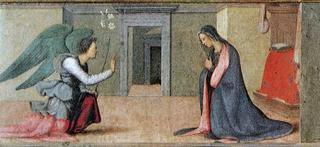
One of the features that I mention in
How To Get The Most Out Of The Eucharist
is something I call "P.R.A.Y.":
What are some concrete steps we can take that will help us get the most from the Word of God? Here are a few that can easily be remembered by using the word P.R.A.Y. ...
P ... Prepare by studying Scripture and coming to a better understanding of how Catholics approach and interpret the Word... The less familiar we are with the Word that we hear proclaimed at the Eucharist, the more likely we are to be distracted by what we hear rather than fed.
R ... Read the Mass readings beforehand... If we read beforehand we can better listen when the readings are being proclaimed, and it is more likely that we will truly hear what God wishes to say to us.
A ... Attend to what is being read to us at the Eucharist. Listen in a way that acknowledges that God wishes to speak to you at this Mass...
Y ... Yield to what God is asking of you and respond with a "yes." Every celebration of the Eucharist is a renewing of the covenant between God and us. God waits for our response.
Beginnning this week, I offer an outline for those interested in preparing for the upcoming Sunday's Gospel by hightlighting this P.R.A.Y. model here:
Thirty Second Sunday in Ordinary Time, Year A
Matthew 25:1-13
P. Prepare
Of Foolish Virgins and the Bridegroom
1. This parable of Jesus' is only found in Matthew's Gospel.
2. Most Kingdom parables have are concerned with the present, this one is concerned with the future. "The Kingdom of heaven will be like..."
3. The wedding practice mentioned in the parable was not the norm in Jesus' day. Bridesmaids did not wait for the groom, nor were latecomers rejected. We might infer from this that the Kingdom's way is not our way.
4. Although the virgins appear the same at the beginning, some our proven to be foolish at the appearance of the groom.They are wrong in thinking that the groom will come soon (obviously the groom is Jesus and the second coming is his appearance) but in fact the wise virgins do not expect a quick coming of the groom and are prepared with extra oil for their lamps.
5. The foolish virgins, i.e. followers of Christ think that accepting the invitation is enough but more is demanded.
6. What does the "reserve oil" represent:
Augustine thought it was love which is God's gift but our responsibility. Chrysostom took it to be almsgiving and our treatment of the needy (which will come up again in the same chapter of Matthew's Gospel).
7. In Matthew's Gospel being a disciple of Jesus is tough. How does this conflict with our view of what following Jesus means? Are we more like the foolish virgins who think our relationship with Jesus is enough?
8. Throughout Matthew's Gospel Jesus envisions there being two types of Christians within the Church: those who take seriously the constant repentance and those who do not.
9. The Father's interepreted the virgin's sleep as death which reminds me of a homily I once heard about the priest never seeing a U-Haul trailer attached to a hearse, but it turns out that in this parable we do take it with us and will what we take be enough?
10. In the parable the groom finally arives in the middle of the night (when it is darkest, in a culture that did not have electricity and having the "light" was an absolute necessity to venturing out).
11. At the moment of his coming the Church suddenly becomes very individualistic, as in other parables of Judgement--all now depends upon what we did, not our group. Here the Church is communal, we are to help one another but at the moment of Judgement it is all changed.
12. There comes a moment when it is too late to repent--the message of the parable is don't wait until it is too late, and be prepared, take stock of what you are doing with the relationship that you have with Christ. Is your lamp burning? Are you running on "Full"?
R. Read
Read Matthew 25:1-13 slowly. Several times if necessary. Then think about it. You might want to read it again before you go to Mass on Sunday.
A. Attend
Listen to all of the readings at Mass. How does the First Reading and Responsorial Psalm add to what the Gospel says? What speaks to you as you hear the Gospel proclaimed? What in the homily touches you or adds to what you were already thinking?
Y. Yield
How can you recommit your life to Jesus and be ready for his coming? What concrete steps can you take this week to be aglow with His love? Ask Jesus to fill you in the Eucharist.




